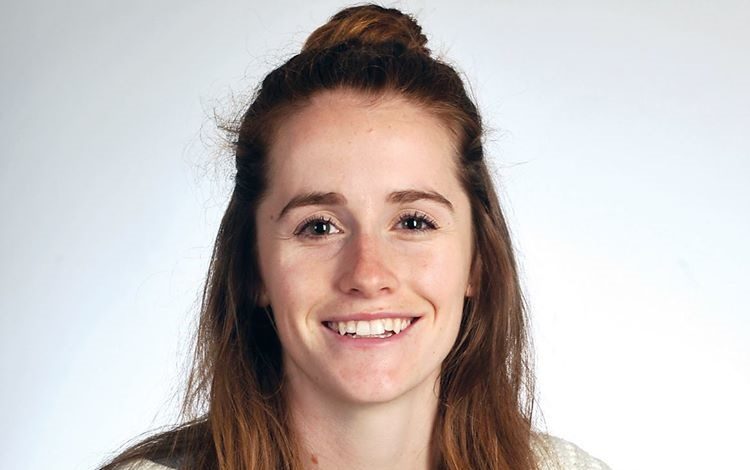

The transition from being a full-time MOT student to working your very first job as an OT may seem daunting to those immersed in placements and classwork: the demands of new roles in OT are different, the learning curve can be steep, and the expectations that we place on ourselves can be overwhelming. We sat down recently with Sarah Patrick (MOT 2021) to discuss this transition and demystify the process of settling into a first position as an OT.
How did you end up in your current position, and what were your first few months in it like?
I actually started out working two jobs at first: I found a casual role at VCH, which is public, and worked part-time at Tall Tree, which is private. I’d done a placement at Tall Tree on The Island and really liked them, so I reached out to them to see if they had any openings. As luck would have it, they were able to expand my role there, so now I’m working for them full-time, and I love it.
My first few months out of the program were interesting, because working two jobs meant having two learning curves at the same time. My role at VCH was acute, and at Tall Tree I was doing outpatient work. I’m glad I got the opportunity to work at VCH, because I learned a lot about how things work in public care and in an acute setting, but my heart was always with outpatient work.
What was your last term in the program like? How did it dovetail with your current role?
I had a lot of apprehension about what life after school would look like, and I channeled my anxiety into applying early for a job. I started earlier than most people, before we’d even started our last placements, and I applied everywhere. One thing I’d recommend to current students is to reach out to your previous placements if you think they were a good fit—they know you, and you’ve already been oriented there, so it’s an easy decision for them if they have an opening. What ended up working for me was writing directly to the clinic director of Tall Tree, letting them know how much I’d liked my placement there, and asking if they would consider interviewing a new grad. Luckily, they did! I was the first new grad OT they’d ever hired and they’ve since brought several more onto the team.
What are some of the biggest surprises of the new position, and what have some of the biggest lessons that you’ve learned been?
One of the biggest surprises for me has been how much creativity you end up using in OT. As a newer OT, at first I’d always ask myself what an experienced OT would do, and I’ve had to stop doing that and trust in my clinical reasoning, instincts, and experiences. One thing you learn quickly is that there’s never one right way to do things. My approach to a problem will be different from my colleagues’, and theirs will be different from other people’s. All of our approaches are valid; we’re just approaching the question from different perspectives.
One of the biggest lessons is that you just keep learning—the more you learn, the more there is to learn. The program teaches you how to think and reason; the specific training for your job comes later. It can be a little overwhelming at times, but I’m also incredibly grateful to be in a profession where every day is different and I’m always learning something new.
When it comes to occupational balance, you have to practise what you preach and actually take care of yourself. Make time for a lunch break, go for a walk, and remember that some things can wait until the next day. As OTs, we’re natural problem-solvers, so we’re always looking for solutions, but we also put a lot of pressure on ourselves, too.
I’ve learned the importance of finding a mentor. At the end of the day, you have to ask questions when you’re unsure of something. People expect you to ask questions as a new OT, and, if you don’t ask for help, no one’s going to know you need it. It’s OK not to know everything or be able to do everything on your own.
If you could go back in time and give yourself advice as a first-year student, what would you say?
The first thing I’d tell myself is: you’re going to get through the program. I was always so nervous to start placements, but they aren’t that scary, and you’re there for a reason. OTs are in high demand in Canada, so you don’t have to worry about difficulty finding a job once you finish the program. I would’ve told myself that I had all the tools I needed to succeed and that I shouldn’t worry so much about how I’d do.
Have you faced any particular challenges in your new role? What solutions have you found to them?
It’s been a hard road. When you graduate, you go from being fully focused on life as a student to suddenly having your own patients to take care of. As OTs, we want to help people so much, and it’s easy for us to be hard on ourselves for not doing enough or not helping our clients as much as we should. Early on, I found myself dwelling on things I could’ve done better each day. I had a lot of anxiety in the early months, which was made worse by the extra strain COVID-19 has placed on our health care system, and I actually started seeing a counsellor for the first time because of it. I’m really open about it, because I think it’s important to normalize seeing a counsellor; a friend of mine who’s a new OT also started seeing one and it’s been really valuable for giving us tools to manage the changes and stresses of being a new grad. I want people to know that it’s OK to need help and that it’s not a weakness to talk about mental health.
Some other really important things for me have been to make sure I have work-life balance and to practice self-care. You want to do the best possible job as an OT, but you still have to make time for hobbies and friends and find meaningful occupations outside of work. These are the exact same things we’d tell our clients or anyone interested in OT, but it can be hard to apply that advice to yourself. You have to have a lot of self-compassion. As far as work, in both public and private practice, my supervisors have encouraged me to always ask questions no matter how simple they seem—they’d be worried if I weren’t asking questions! Another thing is that it’s easy to doubt yourself as a new OT and to think you’re not really making a difference, but you are. Just because you’re new doesn’t mean that you’re not having an enormous impact on people’s lives, and you may be approaching things in a fresh way which can be really valuable.
What advice would you give current students who are thinking about their upcoming transition into clinical practice?
It’s a hard transition, but you can do it. You have to learn how to live with uncertainty and be comfortable with being uncomfortable; debriefing with your team at the end of the day helps you get things off your chest and hear a different perspective if you feel you could’ve done better with a client. We go into OT because we care, but sometimes, we care too much. It’s important to take care of yourself so you can take care of your clients. Other advice? Make sure to keep some work-life separation, and don’t be afraid to reach out to your OT friends and colleagues. Imposter syndrome is real, but you feel it a lot less when you lean on each other for support, because everyone has it. I’d also say to pick an area of practice that’s meaningful to you. Picking an area that you care about makes it all worth it in the end.
Do you have any questions for recent MOT graduates? Keep an eye out for our interviews with other alumni of the program as they navigate their first few years of practice in the profession.